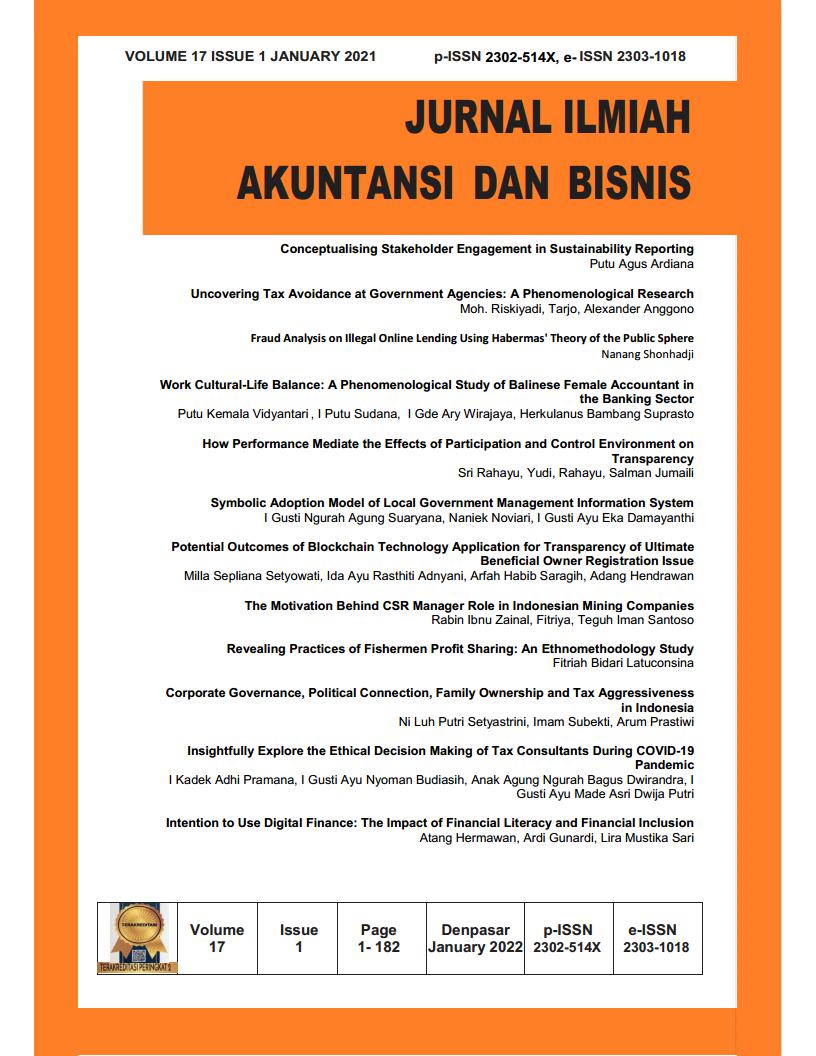Revealing Practices of Fishermen Profit Sharing: An Ethnomethodology Study
Abstract
This study aims to uncover the practice of profit sharing of fisherman in Yainuelo Village, Central Maluku Regency and the meaning behind the practice. This research uses a qualitative method with ethnomethodology approach. The instruments for the data collection are observation and interviews whereas the informants in this study are eight people who work on fishing boats. The obtained data then analyzed using indexicality and reflexivity analysis. The results showed that the Yainuelo fisherman practiced profit-sharing in seven stages namely, tahlilan (praying), cooperation agreement, fish catching, loading and unloading, selling, bage sala (profit sharing between the owner of the ship and the owner of the raft), and barekeng (profit sharing between the shipowner and the captain and crew). In practice, they not only share material (money) but also share prayers, share happiness, information to train skills that are interpreted as brotherhood, justice, honesty and a spirit of help.
Keywords: profit sharing, ethnomethodology, fishermen.
Downloads
References
Antonio, M. S. (2001). Bank Syariah dari Teori Ke Praktik. Gema Insani Press.
Chodjim, A. (2011). Al-Fatihah: Membuka mata batin dengan surah pembuka. Serambi Ilmu Semesta.
Fardani, N., Nafi’ah, A., Kurniawan, S. C., & Putra, G. S. (2019). Penerapan bagi hasil antara sopir bus dengan toko oleh-oleh malang. Oetoesan-Hindia: Telaah Pemikiran Kebangsaan, 1(2), 79–84. https://doi.org/10.34199/oh.1.2.2019.004
Firdaweri. (2014). Perikatan Syari’ah Berbasis Mudharabah (Teori dan Praktik). ASAS, 6(2), 54–77.
Garfinkel, H. (1967). Study Ethnometodology. Prentice Hall.
Hanif. (2014). Memaknai Bagi Hasil Sistem Mato (Studi Etnografi di Group Restoran Padang X Jakarta. Universitas Brawijaya Malang.
Hanif. (2015). Introducing Mato Based Profit-Sharing Accounting and its Synergy with Cooperative and Sharia. Procedia - Social and Behavioral Sciences, 211(November 2015), 1223–1230. https://doi.org/10.1016/j.sbspro.2015.11.163
Harkaneri. (2013). Memahami Praktik Bagi Hasil Kabun Karet Masyarakat Kampar Riau (Sebuah Pendekatan Etnografi). Universitas Brawijaya Malang.
Hatta, M., Musnadi, S., & Mardani. (2017). Pengaruh Gaya Kepemimpinan, Kerjasama Tim, dan Kompensasi Terhadap Kepuasan Kerja Serta Dampaknya pada Kinerja Karyawan PT PLN (Persero) Wilayah Aceh. Magister Manajemen Fakultas Ekonomi Dan Bisnis Unsyiah, 1(1), 70–80.
Indahyani, F., & Khairuddin. (2016). Sistem Bagi Hasil Nelayan Pukat Cincin di Kota Parepare. Jurnal Galung Tropika, 5(2), 63–70.
Izzah, D. (2018). Kearifan Lokal pada Sistem Bagi Hasil Petani Cengkeh di Bobaneigo Halmahera Utara Maluku Utara (Issue September). Universitas Brawijaya Malang.
Kamayanti, A., & Ahmar, N. (2019). Tracing Accounting in Javanese Tradition. International Journal of Religious and Cultural Studies, 1(1), 15–24. https://doi.org/10.34199/ijracs.2019.4.003
Khasanah, U. (2013). Analisis Praktik-praktik Sistem Profit and Loss Sharing (PLS) Pada Masyarakat Petani Padi di Malang Raya. Universitas Brawijaya.
Khasanah, U., Salim, U., Triyuwono, I., & Gugus Iriyanto. (2013). The Practice of Profit and Loss Sharing System For Rice Farmers in East Java, Indonesia. IOSR Journal of Business and Management, 9(3), 1–7. https://doi.org/10.9790/487x-0930107
Matrutty. (2006). Alternatif Pola Bagi Hasil Nelayan Purse Seine (Studi Kasus Di Kecamatan Saparua). Ichthyos, 5(2), 51–56.
Mulawarman, A. D. (2013). Masa Depan Ekonomi Islam: Dari Paradigma Menuju Metodologi. IMANENSI: Jurnal Ekonomi, Manajemen Dan Akuntansi Islam, 1(1), 1–74. https://doi.org/10.34202/imanensi.1.1.2013.1-13
Nafik, M. (2009). Bursa Efek dan Investasi Syariah. PT Serambi Ilmu Salemba.
Nurhayati, S., & Wasilah. (2013). Akuntansi Syariah di Indonesia. Salemba Empat.
Nurlinda, Z. (2018). Perspektif Mudharabah Pada Perbankan Syariah dan Sistem Bunga Pada Perbankan Konvensional. Polimedia, 22(2), 1–16.
Parera, J. M. (2012). Modal Sosial Sebagai Input Dalam Proses Aglomerasi dan Implikasinya Terhadap Biaya Transaksi (Studi pada UKM Perikanan dan Batu Bata). Universitas Brawijaya.
Qurrata, V. A. (2014). Perbandingan Sistem Bagi Hasil Tiga Alat Tangkap dan Implikasinya pada Kesejahteraan Nelayan Desa Sendang Biru Kabupaten Malang. Jurnal Ilmu Perikanan Tropis, 19(2), 85–92.
Rahmawati, & Yusuf, M. (2020). Budaya Sipallambi’ Dalam Praktik Bagi Hasil. Jurnal Akuntansi Multiparadigma, 11(2), 386–401. https://doi.org/10.21776/ub.jamal.2020.11.2.23
Rawls. (2008). Ethnomethodology’s Program: Working Out Durkheim’s Aphorism. Littlefield Publishers.
Scheltema, A. M. P. . (1985). Bagi Hasil di Hindia Belanda (Marwan (ed.)). Yayasan Obor Indonesia.




















